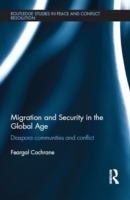This book is an interdisciplinary examination of several interconnecting aspects of migrant communities in the context of contemporary conflict and security. The book illustrates that within this globalised world, migrants have become key actors, living in the spaces between states, as well as within them. Arguing that migrants and their descendants are vital and complex constituencies for the achievement of security in this global age, the volume uses a number of case studies, including Palestinian, Sri Lankan, Irish and Somali diaspora communities, to explore the different ways that such groups intersect with issues of security, and how these attitudes and behaviours have evolved in the context of political transnationalism and the global economy.Comparative and econometric studies of migration can provide a wide lens but at times fail to capture the depth and complexity of these communities and attitudes within them. At the same time, empirically focused studies are often case-specific and, while rich in local detail, lack comparative breadth or the ability to make connections and see irregularities across a number of contexts that might be of interest to scholars beyond that specific area. This book connects these literatures together more thoroughly. In particular, it demonstrates that political, cultural, economic and social factors all play important roles in helping us understand the actual (and potential) roles of migrant communities in conflict and the establishment of sustainable security within contemporary society. Lastly, given this context, the book seeks to examine the challenges and opportunities that exist, for such a sustainable security strategy to be developed.This book will be of much interest to students of migration and diaspora communities, peace and conflict studies, security studies and ethnic conflict.

